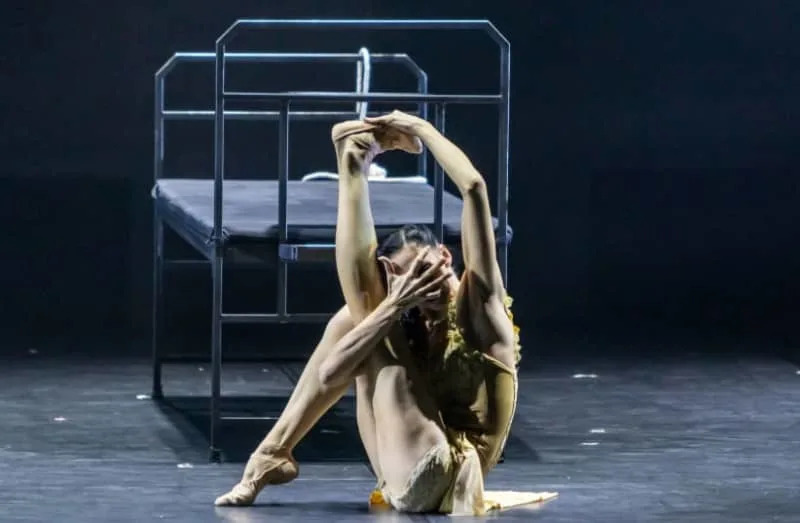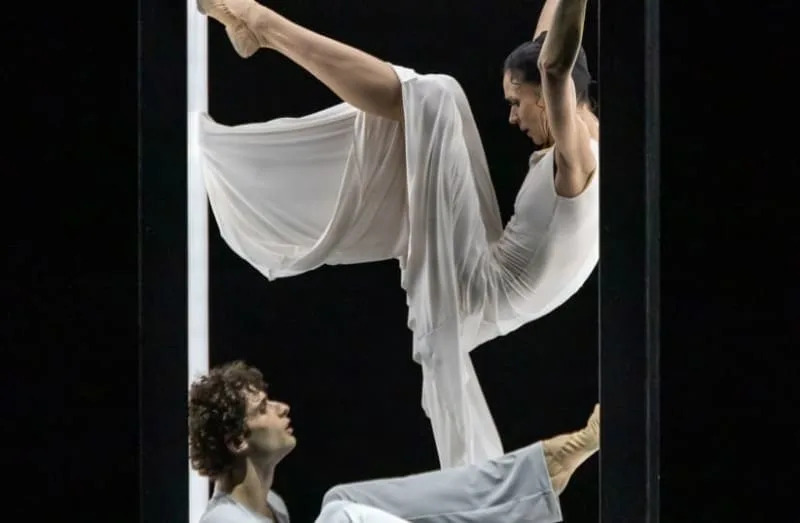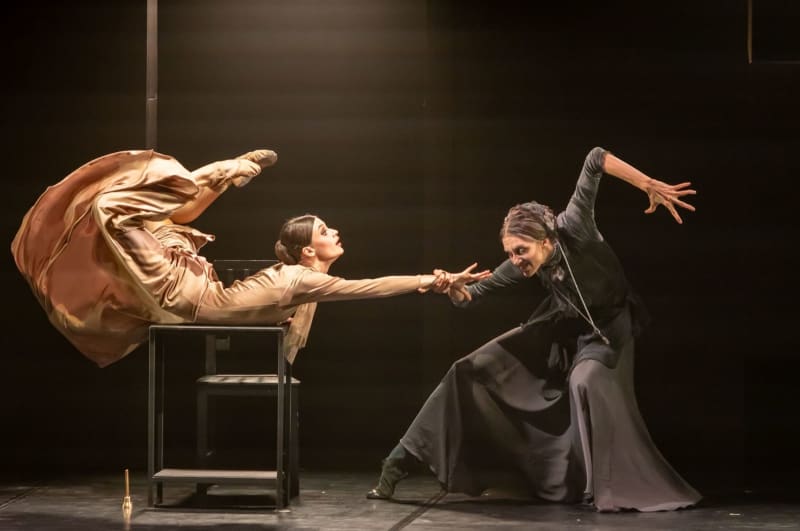St. Petersburg’s Eifman Ballet returns to Israel for a production of ‘Crime and Punishment’ in Tel Aviv.
The Eifman Ballet of St. Petersburg returns to Israel for its 17th visit this month, presenting a bold new production inspired by one of world literature’s most formidable works: Fyodor Dostoevsky’s Crime and Punishment.
The production made its world premiere in St. Petersburg in September 2024; now the ballet will make its Israeli debut at the Israeli Opera house in Tel Aviv next week.
At the heart of the production is the tormented student Rodion Raskolnikov, who, driven by a theory that “extraordinary people” may transcend moral law, murders a pawnbroker and, when his crime unravels, her sister.
The ballet charts his descent into paranoia and guilt, ultimately tracing a path toward redemption, guided by the compassion of Sonya Marmeladova. In Russian choreographer Boris Eifman’s view, the story lays bare an eternal truth: Whoever defies the commandment “Thou shalt not kill” denies “the absolute value of life, the untouchable gift bestowed by God.”
Eifman’s style of psychological ballet
For over four decades, Eifman has built his reputation on what he calls “psychological ballet” – choreography that penetrates beneath the surface to illuminate the emotional, spiritual, and philosophical struggles of characters.

CRIME AND PUNISHMENT, Eifman Ballet. (credit: EVGENY MATVEEV)
“I turn to literary masterpieces not to borrow their plots, but to enrich the production with ideas that lie hidden beneath the text,” he explains on the company’s web page.
He describes his creative process as a “multi-level construction of a ballet performance as a synthetic theatrical spectacle,” where movement becomes a language of conscience, thought, and emotion.
Dostoevsky has long been a touchstone for the 79-year-old Eifman. Following acclaimed adaptations of The Idiot and The Brothers Karamazov, he now tackles what he considers the beginning of Dostoevsky’s great novels.
In this production, Eifman delves deep into Raskolnikov’s psyche, exploring “the emotional and conceptual universe of the author’s central characters” and capturing the “metaphysical contradictions and transcendent passions” that define them.
Set to music by Gustav Mahler and Boris Tishchenko, with evocative sets by Zinovy Margolin, costumes by Olga Shaishmelashvili, and lighting by Gleb Filshtinsky, the ballet reconstructs not only the story’s events but also the psychological landscape of a soul in turmoil, rendering internal struggle visible in every gesture, lift, and turn.
The history of the Eifman Ballet
Founded in 1977 as the Leningrad New Ballet, Eifman’s company was originally conceived by the founder as an “experimental laboratory” and a “ballet theater of one choreographer.”
Its early works, including Two-Voice and Boomerang, immediately sparked critical discussion and established Eifman as a “dissident in choreography,” challenging the conventions of Soviet-era ballet while carving a distinctive path for contemporary dance.
Today, the Eifman Ballet, which consists of approximately 60 dancers, tours internationally, performing in Europe, Asia, South Africa, and the Americas. The company has been celebrated for its ability to “immerse audiences in the boundless world of human passion,” with dancers praised for their “brilliant technique, exceptional commitment, and intellectual interpretation.”

CRIME AND PUNISHMENT, Eifman Ballet. (credit: EVGENY MATVEEV)
Through performances that fuse classical ballet with contemporary expression, the troupe dramatizes the rich literary and cultural heritage of Russia for audiences worldwide.
The ballet has been widely acclaimed in Russia for its innovative choreography and psychological insight, praised as a work that brings Dostoevsky’s moral and spiritual questions vividly to life on stage.
Critics have noted its ability to make the audience feel the torment, anxiety, and ultimate hope of Raskolnikov’s journey, translating the novel’s intense interior into compelling, expressive movement.
Eifman’s artistic vision is rooted in a lifelong engagement with human psychology and moral inquiry. A native of St. Petersburg, Eifman hails from a Jewish family whose survival was shaped by his parents’ flight to Siberia during World War II, though his father’s entire family perished in the Holocaust.
This early encounter with human suffering resonates throughout his work, infusing his ballets with ethical depth and spiritual intensity.
He studied at the Vaganova Ballet Academy and graduated from the choreography department of the Leningrad Conservatory. Over the years, he has received numerous honors, including the Golden Mask Award for lifetime achievement, the title of Artist of Russia, and France’s Chevalier of the Order of Arts and Letters.
In 2013, he established the Boris Eifman Dance Academy. Plans are underway for a new Boris Eifman Palace of Dance in St. Petersburg.
Eifman’s production of ‘Crime and Punishment’
In Crime and Punishment, Eifman’s guiding conviction is that morality and conscience are universal concerns. “Anyone who defies the commandment ‘Thou shalt not kill’ denies the absolute value of life, the untouchable gift bestowed by God,” he says.
Through his choreography, he transforms Raskolnikov’s moral struggle into a meditation on guilt, conscience, and the possibility of redemption, presenting audiences with both a narrative and a philosophical experience.
At the core of Dostoevsky’s novel is Raskolnikov, a young man struggling with poverty, alienation, and a desire to assert his intellectual theories over moral law. His attempt to prove that some people may transcend the rules of morality leads to murder, followed by the psychological collapse that defines the narrative.
Through Eifman’s choreography, these inner battles are externalized, turning thought and conscience into movement. Audiences are drawn into the tension between intellect and morality, guilt and compassion, isolation and connection, and witness the possibility of spiritual rebirth.
At Tel Aviv’s Israeli Opera house, the Eifman Ballet invites audiences to experience literature in motion, where each gesture becomes a reflection of moral and psychological depth. The production transforms Dostoevsky’s moral questions into a live, corporeal exploration of conscience, choice, and redemption.
This production offers more than a retelling of a literary masterpiece: it presents a journey into the human soul, a convergence of literature, philosophy, and dance that resonates long after the curtain falls.
In Eifman’s hands, Crime and Punishment is not merely a performance; it is a meditation on guilt, conscience, and the possibility of redemption, a rare opportunity to witness the transformative power of dance at its most profound.
The Eifman Ballet performs ‘Crime and Punishment’ daily at the Israeli Opera house, September 8 to 13, with two shows on Saturday, September 13. For tickets, call (03) 693-7777, or visit www.israel-opera.co.il
